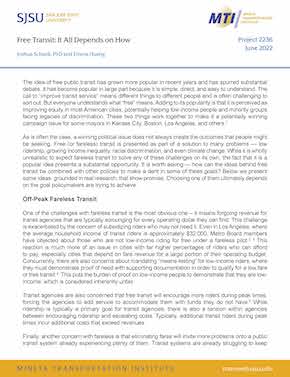- 408-924-7560
- mineta-institute@sjsu.edu
- Donate
Free Transit: It All Depends on How
The idea of free public transit has grown more popular in recent years and has spurred substantial debate. It has become popular in large part because it is simple, direct, and easy to understand. The call to “improve transit service” means different things to different people and is often challenging to sort out. But everyone understands what “free” means. Adding to its popularity is that it is perceived as improving equity in most American cities, potentially helping low-income people and minority groups facing legacies of discrimination. These two things work together to make it a potentially winning campaign issue for some mayors in Kansas City, Boston, Los Angeles, and others. As is often the case, a winning political issue does not always create the outcomes that people might be seeking. Free (or fareless) transit is presented as part of a solution to many problems — low ridership, growing income inequality, racial discrimination, and even climate change. While it is wholly unrealistic to expect fareless transit to solve any of these challenges on its own, the fact that it is a popular idea presents a substantial opportunity. It is worth asking — how can the ideas behind free transit be combined with other policies to make a dent in some of these goals? Below we present some ideas, grounded in real research, that show promise. Choosing one of them ultimately depends on the goal policymakers are trying to achieve.
JOSHUA SCHANK, PHD
Joshua Schank holds a PhD in Urban Planning from Columbia University and a Master of City Planning from the Massachusetts Institute of Technology. He is a Research Associate at the Mineta Transportation Institute, a Managing Principal at InfraStrategies, and a Senior Fellow in the Institute for Transportation Studies at the University of California, Los Angeles. Dr. Schank previously served as Chief Innovation Officer of the Los Angeles County Metropolitan Transportation Authority (Metro), President and CEO of the Eno Center for Transportation, and Transportation Policy Advisor to Senator Hillary Clinton (D-NY).
EMMA HUANG
Emma Huang is a Senior Consultant with InfraStrategies LLC. Emma previously worked as a Transportation Planner in the Office of Extraordinary Innovation at LA Metro. She has a Master of Public Policy from the University of California, Los Angeles.
-
Contact Us
San José State University One Washington Square, San Jose, CA 95192 Phone: 408-924-7560 Email: mineta-institute@sjsu.edu






